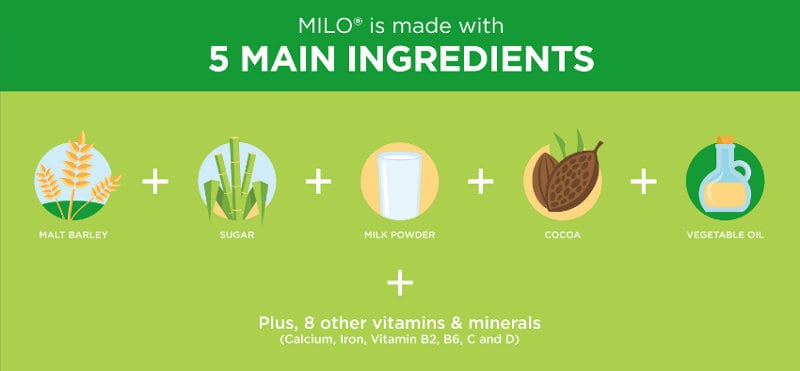ADVERTORIAL
MILO has been a part of our lives since the 1930’s, but it’s more than an iconic Kiwi drink. MILO with milk is a nutritious formulated supplementary food. It’s packed with essential nutrients – which gives your kids a nutritional boost to get them through their day.
What’s MILO made of?

1. Malt Barley
Believe it or not, barley is a cereal grain and a member of the grass family. Malt barley extract in MILO contains carbohydrate and sugars to give active kids the everyday energy they need. It contributes to the unique and delicious malt flavour of MILO that we have loved since our own childhood!
2. Milk powder
The milk powder in MILO comes from fresh dairy milk. The water is simply removed to make it milk powder. This ingredient provides your kids with essential protein, vitamins and minerals and it contributes to the creamy flavour and texture of MILO.
3. Sugar
Sugar is a source of fuel for your kid’s active brain and body. There are three main types of sugar in MILO powder:
- Lactose, found in milk powder
- Maltose, found in malt barley
- Sucrose, found in cane sugar
Add MILO to milk to give your kids a low GI drink that gives them the energy they need to run, play and think.
4. Cocoa
If you don’t already know, the trademark MILO taste comes from the cacao tree beans. The beans are fermented, roasted, shelled, and ground to make cocoa. The cocoa in MILO is UTZ Certified – which stands for sustainable farming. So farmers can grow better crops, generate a higher income and create better opportunities – all while striving to protect the environment and securing the earth’s natural resources!
5. Vegetable Oil
Nestlé only source RSPO (Roundtable on Sustainable Palm Oil) Segregated certified palm oil to make MILO. This ensures the palm oil in MILO is sustainable and traceable.
The ingredients in MILO powder help to provide growing kids with a variety of nutrients their bodies need. Let’s find out more …
Protein and MILO
Did you know that MILO adds 31% more protein to a glass of milk? Here’s how:
- 20g MILO powder has 2.4g protein
- 200ml trim milk has 7.8g protein
- A glass of MILO with milk has 10.2g protein
Why is protein important for your kids? Well, it’s essential for building, maintaining, and repairing the tissues in our body. It’s required for healthy growth and development – so yeah, very important!
Good sources of protein include lean meat, chicken, fish, eggs, legumes, nuts, seeds, tofu, soymilk and dairy milk.
Calcium and MILO
You may be surprised to know that MILO actually adds 65% more calcium to a glass of trim milk! Here’s how:
- 20g MILO powder has 190mg calcium
- 200ml trim milk has 280mg calcium
- A glass of MILO with milk has 400mg calcium, providing 50% of the Recommended Dietary Intake
Calcium plays the ultimate role in your kid’s development – it helps build strong bones and teeth. Eating dairy foods such as milk, yoghurt and cheese every day, will help kids meet their daily recommended calcium intake.
Iron and MILO
Here’s a little fact for you – a glass of milk does not contain any iron, but adding MILO powder to milk will make sure that it does. Here’s how:
- 20g MILO has 3.8mg iron
- 200ml trim milk has no iron
- A glass of MILO with milk has 3.8mg iron, providing 32% of the Recommended Dietary Intake
Iron is essential for healthy and active kids. It supports the release of energy from food, carries oxygen around the body to our brain for concentration and learning, it helps prevent tiredness and fatigue. And most importantly, it supports your child’s healthy immune system to help the body fight infections (making it a parent’s hero!).
Vitamin D and MILO
Apart from sunshine, have you ever wondered where else vitamin D comes from? There is a small amount of vitamin D in milk. Adding MILO powder to milk will boost your child’s vitamin D intake. Here’s how:
- 20g MILO has 3.3 ug vitamin D
- 200ml trim milk has 0.6 micrograms vitamin D
- A glass of MILO with milk has 3.9 ug vitamin D, providing 39% of the Recommended Dietary Intake
Vitamin D is not found in many foods. Our body’s best source of vitamin D comes from safe exposure to sunlight – which can be a challenge during those winter months!. Foods that do contain vitamin D include fish, eggs, milk, UV irradiated mushrooms and fortified foods such as MILO. Like calcium, vitamin D is important for strong bones and teeth along with healthy muscles and immune function.
So next time your child has a cup of MILO with milk, you can rest assured it will give them a nourishing boost to help them make the most of their day.
Information contained in this article was provided by MILO. For more information about MILO, visit www.milo.co.nz.







Leave A Comment
You must be logged in to post a comment.